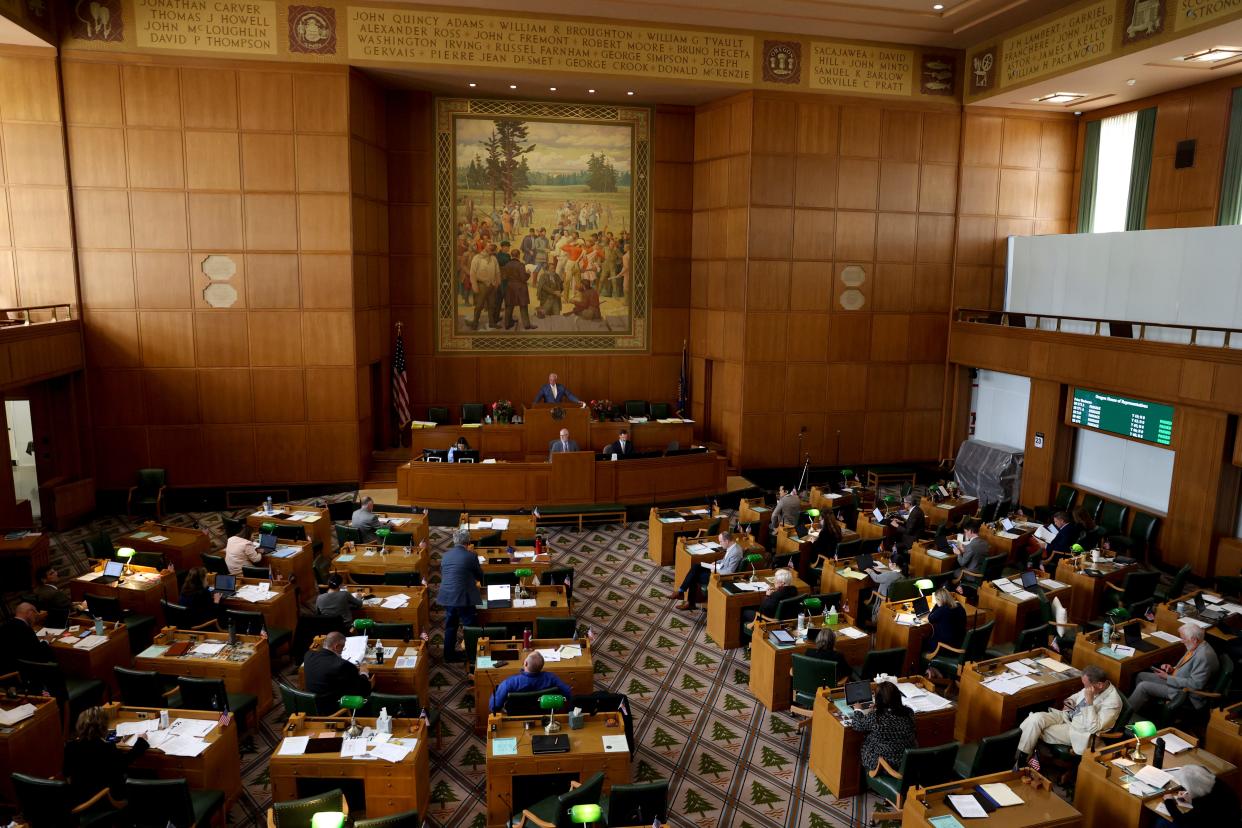Oregon lawmakers begin work surrounding addiction, Measure 110 amid calls for special session

- Oops!Something went wrong.Please try again later.
- Oops!Something went wrong.Please try again later.
A new legislative committee charged with figuring out what Oregon's drug treatment program should look like met for the first time Wednesday night amid calls from other lawmakers to have a special session to urgently deal with what they say are repercussions of Measure 110.
Rep. Jason Kropf, D-Bend, co-chair of the Joint Interim Committee On Addiction and Community Safety Response, said lawmakers have a long-term vision for and commitment to the treatment infrastructure necessary to provide different pathways to get access to treatment.
But at least two lawmakers say there is a lack of urgency to address the state's drug addiction crisis and Measure 110 and they do not want to wait for committee recommendations for the February legislative session.
“Measure 110 has failed Oregonians and the overwhelming majority want change,” Sen. David Brock Smith, R-Port Orford, and Rep. E Werner Reschke, R-Klamath Falls, said in a statement Thursday asking Gov. Tina Kotek to call a special session on the measure.
What Measure 110 supporters said it would do and what is happening
Oregonians narrowly passed Measure 110 in 2020. The law took effect in February 2021, decriminalizing the possession of small amounts of illegal substances, including heroin and cocaine.
Individuals in possession of a small amount of illegal substances receive a citation with a fine. The fine is waived if the person cited completes a health assessment by calling the statewide Addiction Recovery Center hotline or connecting to an eligible Behavioral Health Resource Network.
The measure also allocated portions of Oregon's marijuana tax money for addiction-related services, requiring a minimum of $57 million in annual funding. To date $261 million in grants have been awarded.
Implementation of the measure was shaky, with delays in disbursing funding for the program. The first round went out in 2022. A bill passed during the 2023's legislative session introduced more oversight in hopes of addressing challenges.
In late September, Kotek also announced a Fentanyl Strategic Enforcement and Disruption Initiative to crack down on fentanyl use and distribution, with a focus of enforcement in Portland. Overdose deaths increased 18.2% from April 2022 to April 2023, according to the CDC. Oregon State Police said they have seized 62 pounds of powder and 232,962 fentanyl pills this year alone.
“Measure 110 has failed Oregonians and the overwhelming majority want change,” Brock Smith said in a release.
Brock Smith cited the Centers for Disease Control and Prevention overdose data and failure from a majority of those ticketed under Measure 110 to pay their fine as proof of the measure's failure. Despite more than 5,000 receiving a ticket since implementation, less than 120 have called the treatment referral hotline, he added.
“More lives are lost every day. Our law enforcement officers are put at greater risk and without the necessary tools to protect our citizens and their communities," Brock Smith said.
"I appreciate and thank the Douglas, Coos, and Curry county commissioners for recently passing resolutions requesting the governor and/or Oregon Legislature to repeal Measure 110," he said. "I also appreciate the support of our county sheriffs and district attorneys on these county resolution requests."
At least two ballot initiatives have been filed to alter Measure 110 and Marion County recently joined 11 other counties in introducing resolutions to repeal the measure.
Discussion during first of 4 addiction committee meetings
The Addiction and Community Safety Response committee intends to help shape policy discussions and recommend potential changes to Measure 110 ahead of the next legislative session.
During Wednesday night's inaugural meeting, committee members heard from public health experts, the Oregon Health Authority, and Alcohol and Drug Policy Commission leaders.
Speakers said Oregon's addiction treatment network lacks the appropriate number of staff, beds and services.
There are 42 Behavioral Health Resource Networks and 155 BHRN partners in the state that have been allocated more than $260 million to provide addiction services in Oregon.
In 2021, 19.4% of Oregonians age 12 and up had a substance use disorder, according to data presented by Tatiana Dierwechter, OHA's substance use prevention systems manager. That same national survey also said 17.2% of Oregonians age 12 and up needed but did not receive substance use treatment at a specialty facility.
There’s a 49% gap in substance use disorder services needed, according to Heather Jefferis, the executive director of the Oregon Council on Behavioral Health.
Jefferis presented gap analysis data of resources available for substance use, harm reduction, and recovery from Oregon Health and Science University. She also presented information on the number of residential treatment facilities and their capacity in the state, saying more beds are needed. In Marion County, there are five residential treatment homes with 25 beds and three residential treatment facilities with 29 beds.
There are only three culturally specific substance use disorder residential and withdrawal management programs in the state, Jefferis said.
Senate Majority Leader Kate Lieber, D-Portland, said the money invested from Measure 110 so far is making a huge difference, citing a 44% increase in access to treatment.
Still, she called the state's drug crisis "unacceptable."
“We know that what is happening on the streets of Portland and other places are completely unacceptable," Lieber, who is co-chair of the committee, said in an interview with the Statesman Journal ahead of the committee meeting.
"We cannot continue to have open-air drug markets," Lieber said. "At the same time, we want to make sure that people have the services they need when they need them."
Statesman Journal reporter Sydney Wyatt contributed to this report.
Dianne Lugo covers the Oregon Legislature and equity issues. Reach her atdlugo@statesmanjournal.com or on Twitter @DianneLugo.
This article originally appeared on Salem Statesman Journal: Oregon drug addiction crisis prompts call for special session

